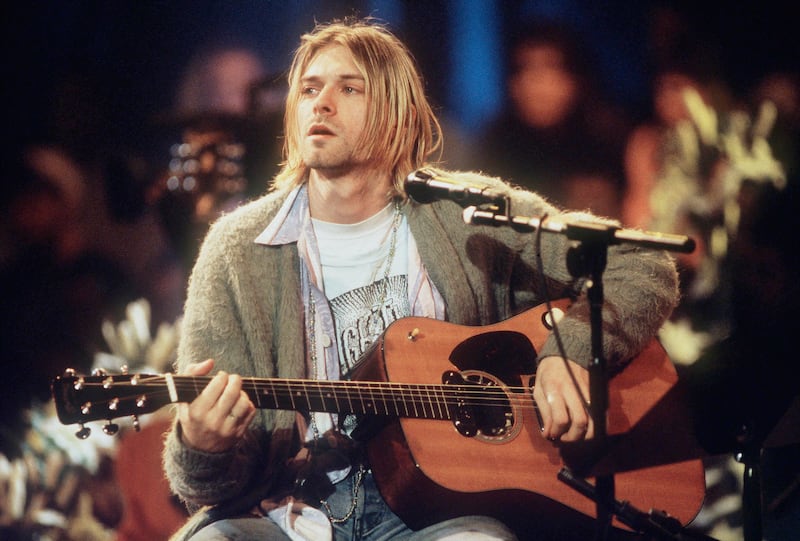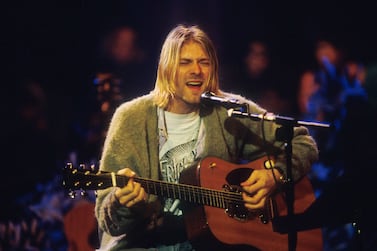'It’s better to burn out than to fade away.”
The line, originally from the Neil Young song Hey Hey, My My, rung with a haunting timbre in Kurt Cobain’s suicide note. The musician was 27 when he died on April 5, 1994. He was at the height of his career with Nirvana and revered for his subversive songwriting that held near-universal appeal.
Yet, even decades on, Cobain’s legacy has neither burned out nor faded away.
To mark the 30th anniversary of Cobain's death, The National speaks to nine established musicians from the Middle East to see how the Seattle rocker influenced their songwriting.
Freek

Freek is at the forefront of the Arabic trap scene, with the rapper dishing out several internationally acclaimed tracks over the past few years including Wala Kilma and Doos. Yet, as entrenched as he is in the rap genre, the Somali artist – who grew up in Abu Dhabi – says part of his musical heritage lies in rock.
“You’ll be surprised,” he says. “I come from a rock household, a metal household. The first time I heard Nirvana, I was eight or nine years old. I saw the music video for Smells Like Teen Spirit and that just blew my mind.”
The song is simple in its arrangement, composition and lyrical content, but that is a large part of its elegance and lends to its anthemic pull. “It has longevity,” Freek, whose real name is Mustafa Ismail, says. “A lot of people tried to break down that song in their own narrative.”
Freek says his own musical approach was very much like that of Cobain. “I felt like he really changed my perspective when it comes to lyrics and music in general,” he says. “I definitely follow that structure of writing. My music can be simple, but it can live in everyone’s journey at the same time. It doesn’t matter how simple the lyrics are, they can be strong. It’s just the way you deliver it.”
Layla Kardan

For jazz singer Layla Kardan, who lives in Dubai, Cobain’s influence came through on a fundamental level, both for her and the international music scene that shaped her.
“For any musician, it doesn't matter what genre your music is in – we all draw inspiration from Kurt Cobain,” Kardan says.
“He was so free in his expression. His style of singing influenced me to want to do a version of Smells Like Teen Spirit in my own jazzy style. And I love playing that with a band. There’s such dynamism to his music,” she continues. “He was really pushing the envelope. He was really breaking boundaries. And yeah, he did it in a really cool way.”
Smokable
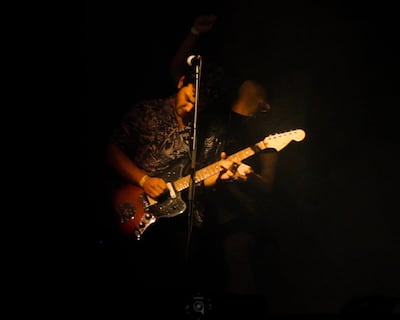
Abdo Ineni, who goes by Smokable, first encountered Nirvana aged 13 and it was the raw nature of Cobain’s songwriting that first gripped him.
"Ironically, it wasn’t the guitar, the noise, the heavy feedback that I first heard," he says. "It was the MTV Unplugged in New York album.”
Recorded in November 1993, the album was released seven months after Cobain’s death. It was a hit, even by Nirvana’s standards, and was revered by critics as well as fans. “I had no idea who they were before that,” Ineni says. “The music and lyrics meshed so well, and I loved that about him. There's this sense of self-awareness, both comedy and tragedy. Something about Cobain’s voice. The way he sings his lyrics. He lives through them.”
Following the thread of MTV Unplugged in New York, Ineni began exploring more of Nirvana’s repertoire, coming across the grungy soundscape the band is perhaps best known for. “I became immersed in their distortion, especially the way Cobain plays his guitars, his rhythms. As a kid listening to it, I was struck, like how could his guitar sound like that?”
Ineni says that Cobain’s most important legacy was his honesty. “He was honest with himself,” Ineni says. “And he was true to his music and songwriting. He amplified the blues into such a big stratosphere, it sort of just like became a wall of sound, a wall of noise.”
Jay Wud
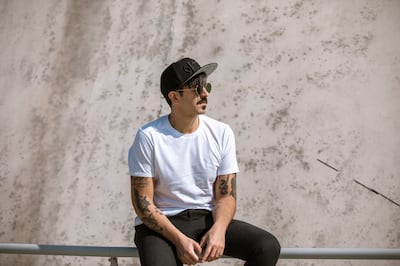
Even on the other side of the world from Seattle, no musician defined the Lebanese rock scene quite like Cobain and Nirvana, says veteran rock musician Jay Wud.
“In Lebanon, everyone was obsessed with Nirvana – it was all Nirvana T-shirts, and discussions about Kurt Cobain everywhere I went,” Wud says. “I fixated on his acoustic concert for MTV Unplugged. I was never able to erase that acoustic-electric mash-up sound from my head. I must have watched it a million times.”
As Wud himself expanded his own rock sound, and later ventured into electronic and trip-hop with his project Sinner Saint Human, he continued to think back to Cobain, using him and his band as a guiding light.
“They genuinely pushed music forward,” Wud says.
Sandy Syn

Sandy Syn, the lead singer of the metal bands Amen Graves and Gates of Gomorroah and make-up artist, has found inspiration from Cobain in both of her careers.
“Nirvana was my entryway into where I am now,” explains Syn, who has Malaysian, American and Lebanese heritage and lives in Dubai. “I'm a metal vocalist. Before listening to metal, I started listening to Nirvana and grunge music. That’s where it all started for me.
"And as a make-up artist, Cobain has played a major role in my general make-up aesthetics, both on myself and my clients. When I create mood boards, Cobain is ever present, both for his style, his spirit and even his penchant for black eyeliner.”
Naser Mestarihi
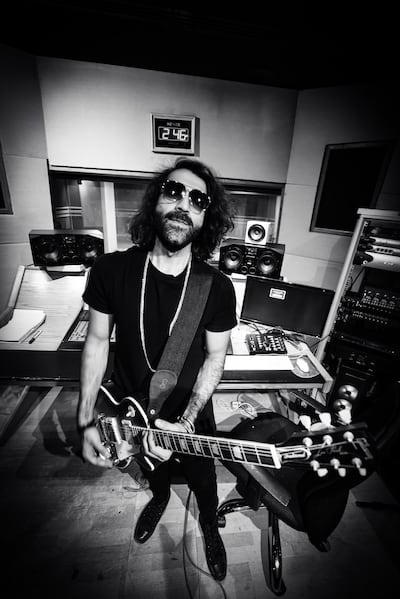
Put simply, Nirvana changed the life of Naser Mestarihi, the Jordanian-Pakistani frontman and lead guitarist of the band Winterburn.
From the first time that Mestarihi, who lives in Qatar, heard Cobain’s music, the simplicity of his melodies and pop sensibility burrowed deep under his skin, shaping his taste and ultimately leading him towards a life dedicated to music.
But as he grew older, the rocker found Cobain’s work resonates differently. Some of that is on a technical level, as he’s modelled much of his vocal stylings and doubling after Cobain. Even his next single is earning comparisons from friends to Cobain’s melodies. But even more so, there’s a personal element.
“I related to Cobain’s childhood, the subject matter he chose and his intense lyrics even as a younger person, but as I got older, and experienced things, it gained new meaning,” Mestarihi says. “But even then, there’s something very comforting about it, despite how dark the topics and the themes can be. When you've experienced really hard times, his writing makes it easier. And if you write, you learn to put your pain in music, too.”
Bojan Preradovic

Serbian musician Bojan Preradovic, who grew up in Lebanon before co-founding the long-running alternative rock band Empty Yard Experiment, is still mourning the loss of Cobain.
“It’s hard to stomach the fact that it’s been 30 years since his passing. Not least because he and Nirvana still exert such a colossal influence on both pop music and the cultural zeitgeist,” says Preradovic.
“Kurt Cobain was responsible for my musical awakening and Nirvana, for my generation, are what the Beatles were to everyone in the years prior to the ‘90s. Those songs are like nursery rhymes that you simply can’t forget, an indelible imprint on the creative lens through which you view the world.
“He was a fantastically talented pop songwriter. But on an even deeper, psychological level, he is still very much relevant, and the Seattle alternative scene is still lauded as the world’s last genuine musical and cultural movement because of what they tapped into before the industry rolled in and commodified and cheapened it all like they always do.
"It gathered up all of us adolescent nerds and geeks, corralled all the disaffection and disillusionment that we felt for the world, and gave us such a sweetly dissonant and cathartic way to feel like we belonged to something. That’s a universal human experience and it’s something that’s going to continue to resonate with every new generation.”
Ratish Chadha
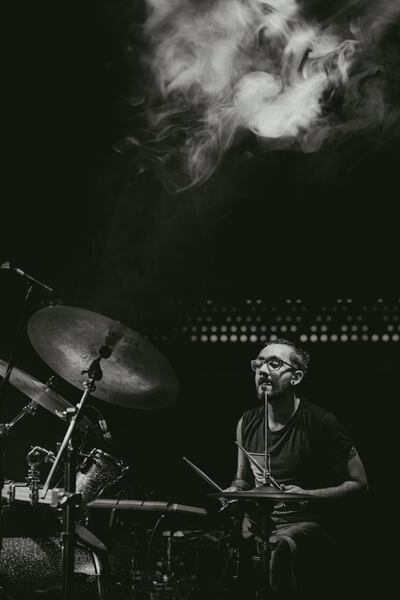
Indian musician Ratish Chadha is a staple name in the local music scene. He is a member of the trio Noon, Abri and The Everlasting, as well as the experimental band Bull Funk Zoo and has spearheaded several music initiatives in Dubai.
He says that while does not listen to Nirvana as much as he did during his younger years, he is still gripped by the way Cobain championed music as an unmatched avenue of free expression. It was one song in particular that he found form as a drummer.
“Smells Like Teen Spirit was one of the first songs I learned on drums so that way I guess it will always be a part of my history with the instrument,” he says. “Just like every rebellious teenager, I think Kurt Cobain had quite an influential impact. Kids that were feeling misunderstood and didn't really have anything besides this music to be a guide for them."
He adds: “Artists like Kurt Cobain definitely influenced me and what I'm doing with music."
Zeid Hamdan
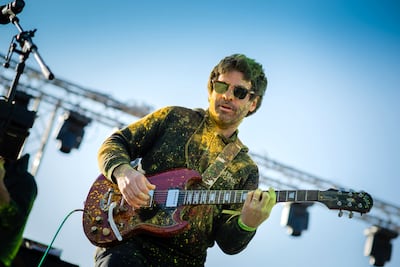
From his work with the ground-breaking Arabic trip-hop duo SoapKills, to his most recent group Bedouin Burger, the Lebanese artist Zeid Hamdan is viewed as one of the most revolutionary architects of the Arabic indie music scene, with more than 20 albums and EPs to his name.
He is also an acclaimed producer and composer, having led recordings from fierce singers Maryam Saleh and Hiba Mansouri, as well as scoring the soundtrack to the 2016 Saudi romantic comedy Barakah Meets Barakah.
Hamdan says his eclectic approach to his craft and healthy cynicism of the music industry is partly inspired by Cobain’s mercurial career.
"It is the simplicity of his compositions, the raw sound and minimalism as well as the fierce honesty of the song's message that I find inspiring," he says.
"From a production standpoint, I love the homemade feel behind the songs and how it can even sound unplugged just on guitar."
